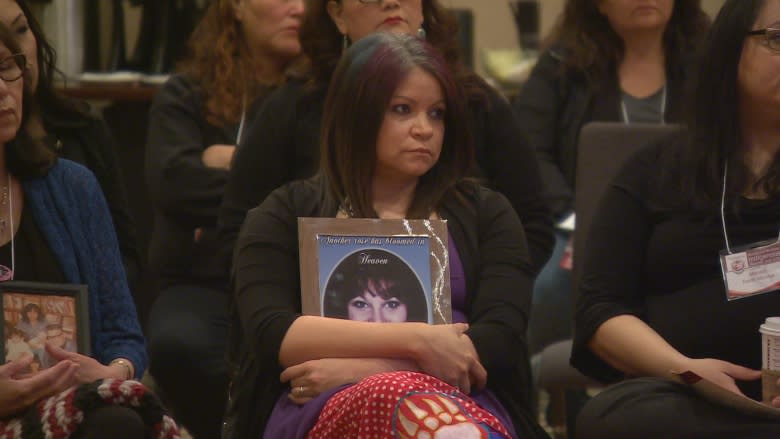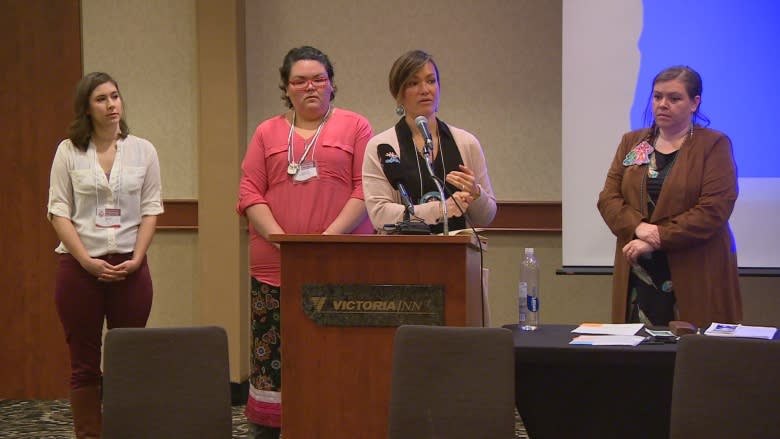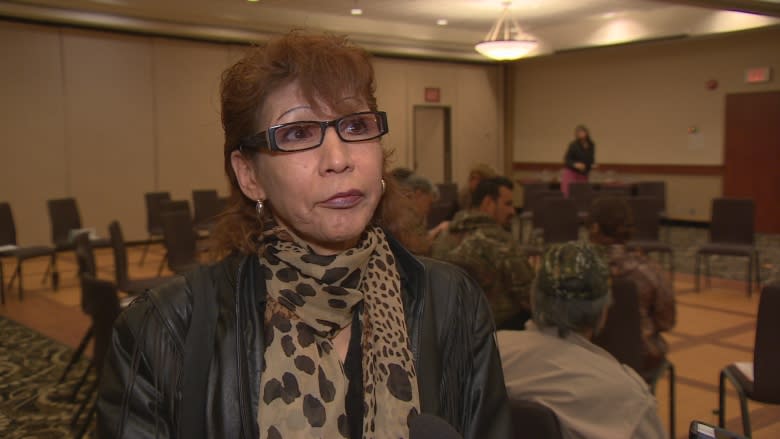Manitoba families meet with missing, murdered Indigenous women inquiry staff
Families of Indigenous women who are missing or have been murdered sat in a circle Thursday morning at Winnipeg's Victoria Inn to find out how they can participate in the national inquiry into missing and murdered Indigenous women.
Staff from the national inquiry, which will begin hearing testimony from family members in May, were invited to speak by the Assembly of First Nations. The AFN has been travelling around Manitoba doing inquiry outreach and has visited eight Manitoba communities so far, with Winnipeg being its ninth and final stop of this leg of the outreach tour.
"There are a lot of families and a lot of people who want the information," said AFN regional Chief Kevin Hart. "I think that hearing it from the people from the national inquiry, it is very important for them to hear it first-hand."
Representatives from the inquiry included director of community relations Waneek Horn-Miller, commission counsel Christa Big Canoe, communications advisor Tiar Wilson, and researcher Kelsey Hutton.
"It's very encouraging to see these women at the forefront putting their names forward, there to represent not only their people as Indigenous women, but to also get the information out to these families, because some have been directly affected by this national tragedy as well," said Hart.
Right now there are three community relations staff members working with the commission, but Horn-Miller said eventually there will be nine people doing outreach to get more families involved.
Currently, 152 people have registered to testify in front of the commission.
Christa Big Canoe explained to the families how they can participate, either publicly to privately, by submitting anything from a sworn statement to a piece of art or poetry.
"In order to make change [the commissioners] need to hear the stories," said Big Canoe. "They need to hear what families experienced when they tried to look for their loved ones."
Big Canoe told the families that they should also share stories about resilience, survival and successful efforts to combat violence against women and girls.
"The important part of my job is to make sure all relevant information is presented to the commissioners in a fair and neutral way," she said.
The commission's legal team is made up of nine people, and each family participating in the inquiry will speak with one of the lawyers about their case.
Families had the chance to ask more in-depth questions about the inquiry process during the session, which was closed to the media.
'A lot of questions'
Sue Caribou is one of 28 family members who attended the session at the Victoria Inn.
Her niece, Tanya Nepinak, went missing in 2011. Convicted serial killer Shawn Lamb was originally arrested in connection with her case, but charges were stayed because of a lack of evidence.
"I really have a lot of questions," said Caribou. "I am very tired today, I had a restless sleep thinking about this a lot."
Caribou said sharing her story is getting more difficult every time she tells it.
"I have to keep repeating," she said. "The pre-inquiry and [this], re-opening the wounds again."
She will have to share her story at least two more times — once at an inquiry advisory session in May and then when she testifies before the commissioners.
"We could have barrelled through and rushed into hearings but that would almost be irresponsible," said Horn-Miller.
She said she understands how hard it is for the families to keep reliving their pain, but said the inquiry wanted guidance from those affected on how to design the process.
"That's why moving forth with caution is out of respect," she said.
Horn-Miller said the families who attended Thursday's session can begin the testimony process in May when the inquiry team returns for its advisory session.
She said at that point, families can begin meeting with commission counsel so the lawyers can start digging into their cases and begin compelling evidence if necessary.
The three day advisory hearing begins on May 1 with a public session. The second day will be open only to the families. The commission will hear from officials and grassroots organizations working on MMIW issues and violence prevention on the third day.




